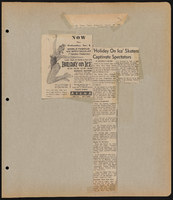Search the Special Collections and Archives Portal
Search Results

Transcript of interview with Hazel Hedges by Irene Rostine, October 29, 1997
Date
Archival Collection
Description
Interviewed by Irene Rostine. Hazel Hedges moved from Kansas City to Las Vegas with her husband and son in 1952. She worked briefly as a waitress in the dining room at the Thunderbird and then became a stay at home mom until her son was in junior high. Then after she went to real estate school, she went to work in commercial real estate at Bond Realty. After that, she passed her brokers exam and transferred to Parkway Realty where she sold land. Her primary success in real estate came from selling houses and investing in land and residential properties personally. After leaving Parkway Realty, Hazel went to work for the real estate office Deshoor, Fair, and Davis, which she eventually bought and renamed Southside Realty. Eventually her son joined her, and they operated Hedges and Wade Realty with two offices, one on each side of town. Hazel also did volunteer work including the Assistance League Las Vegas' Operation School Bell Program, which provides clothing for area school children in need.
Text

Interview with Donald R. Owen, June 23, 2004
Date
Archival Collection
Description
Text

Interview with Wayne Albert Violette, January 12, 2005
Date
Archival Collection
Description
Text

Meeting minutes for Consolidated Student Senate, University of Nevada, Las Vegas, August 30, 2004
Date
Archival Collection
Description
Text

Interview with William Marvin Swena, October 29, 2004
Date
Archival Collection
Description
Text

Interview with Larry Neese, July 1, 2004
Date
Archival Collection
Description
Text

Jill Roberts oral history interview: transcript
Date
Archival Collection
Description
Oral history interview with Jill Roberts conducted by Barbara Tabach and Claytee D. White on March 20, 2018 for the Remembering 1 October Oral History Project. In this interview, Jill Roberts discusses her position as the CEO of the Trauma Intervention Program (TIP) of Southern Nevada. She also delves into her part-time work at the coroner's office as a death investigator and discusses her personal background in Las Vegas, Nevada after she moved to the city in 1977. She describes the role TIP had during the aftermath of the October 1, 2017 mass shooting, where well-trained volunteers were dispatched to hotels, hospitals, and anywhere else the survivors reached in order to provide emotional and practical support. Throughout the interview, Roberts emphasizes that the assistance provided to those in a traumatic event depends on each individual's needs. She shares a few examples of what the TIP volunteers had helped with after the shooting, including listening to the survivors' stories as well as providing information on the situation, helping separated loved ones find each other, arranging travel for some survivors to go back to their homes, and procuring clothes and shoes for those who needed them. Roberts also discusses the gratitude TIP had received after the shooting, including the thank you cards sent by Sandy Hook High School.
Text
Henry and Anita Schuster Papers
Identifier
Abstract
Collection is comprised of correspondence, speeches, essays, meeting minutes, photographs, research materials, publications, press clippings, awards, and event programs (1941-2011) that document the life of Henry Schuster, and his work with his wife Anita. Materials are mainly related to the Holocaust and to Holocaust memory and survivor organizations (especially the Holocaust Survivor's Group of Southern Nevada, which the couple founded, and L’Œuvre de Secours aux Enfants). Genealogical information is also included, as well as records of Henry Schuster’s time in the U.S. Army and his studies at the Manhattan Technical Institute.
Archival Collection
Richard B. Taylor Papers
Identifier
Abstract
The Richard B. Taylor Papers (1920-1993) document Richard Taylor's career and interests as a longtime Las Vegas, Nevada businessman and local historian, including his work as an executive at the Hacienda Hotel and Casino. The materials also include maps, development plans, and local publications for the Nevada communities of Laughlin and Mount Charleston, as well as publicity and promotional materials for these projects. As an amateur historian, Taylor also collected information on Las Vegas, Laughlin, and Mount Charleston.
Archival Collection

